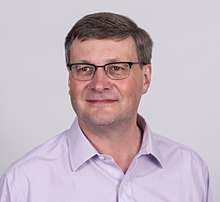John Launchbury
John Launchbury is an American and British computer scientist who is currently Chief Scientist at Galois, Inc. Previously, he directed one of DARPA’s technical offices, where he oversaw nation-scale scientific and engineering research in cybersecurity, data analysis, and artificial intelligence. He is known for research and entrepreneurship in the implementation and application of functional programming languages. In 2010, Launchbury was inducted as a Fellow of the Association for Computing Machinery.[1]
Dr. John Launchbury | |
|---|---|
 | |
| Nationality | British, American |
| Alma mater | Oxford University, University of Glasgow |
| Known for | Functional Programming Languages |
| Scientific career | |
| Fields | Cybersecurity, Data Analysis, Artificial Intelligence |
| Institutions | Oregon Graduate Institute School of Science and Engineering, Galois Inc., DARPA |
| Thesis | Projection Factorizations in Partial Evaluation |
Education
Launchbury received first-class honors in mathematics from Oxford University in 1985, and an M.Sc. in computation in 1986. He holds a Ph.D. in computing science from the University of Glasgow. In 1991, the Cambridge University Press published his thesis, Projection Factorizations in Partial Evaluation, after it won the British Computer Society's distinguished dissertation prize.[2]
Career and research
As a lecturer at the University of Glasgow, Launchbury focused his early research on the semantics and analysis of lazy functional languages and was one of the contributing designers of the Haskell programming language, which Apple developers later cited as one of the influences behind the Swift programming language.[3]
In 1993, Launchbury provided a formal description of lazy evaluation, addressing challenges in analyzing a program’s storage requirements.[4] The operational semantics is widely cited in later research on Haskell. In the context of the Glasgow Haskell Compiler team,[5] Launchbury established an effective partnership with Simon L. Peyton Jones to write a number of papers that dramatically influenced the design of Haskell. Their 1995 paper on State in Haskell[6] introduced the “IO monad” as a mathematically-clean practical way of expressing effects on the external world, and solidified the “do-notation” Launchbury had introduced earlier.[7] Their papers on unboxed values[8] and removal of intermediate data structures[9] addressed many of the efficiency challenges inherent in lazy evaluation.
In 1994, Launchbury relocated to the West Coast of the United States, becoming a full professor at the Oregon Graduate Institute in 2000. His research there addressed the creation and optimization of domain-specific programming languages (DSLs) ranging from fundamental research in combining disparate semantic elements, through embedding DSLs in Haskell, to applied research for modeling and reasoning about very-large scale integration (VLSI) micro-architectures.
Launchbury founded Galois Inc. in 1999 to address challenges in information assurance through the application of functional programming and formal methods.[10] He served as the company’s CEO and Chief Scientist from 2000 to 2014. Under Launchbury’s direction, Galois Inc. developed the Cryptol domain-specific language for specifying and verifying cryptographic implementations. Originally designed for use by the National Security Agency, the language was made available to the public in 2008.[11]
Launchbury is the holder of two patents on cryptographic structures in data storage and one on effective mechanisms for configuring programmable cryptographic components.[12]
In 2014, Launchbury joined DARPA, initially as a program manager, and then as director of the Information Innovation Office (I2O) in 2015.[10] Launchbury led programs in homomorphic cryptography (PROCEED), cybersecurity for vehicles and other embedded systems (HACMS), and data privacy (Brandeis).
In 2017, Launchbury rejoined Galois as Chief Scientist.
Other publications
Launchbury published a theological perspective on the Moral Exemplar interpretation of the doctrine of atonement, entitled Change Us, Not God: Biblical Meditations on the Death of Jesus.[13]
References
- "ACM Fellows". ACM Awards. Association for Computing Machinery. Retrieved 21 September 2016.
- Launchbury, John (1991). Projection Factorizations in Partial Evaluation. New York, NY, USA: Cambridge University Press. p. 163. ISBN 978-0-521-41497-5.
- Lattner, Chris. "Chris Lattner's Homepage". Retrieved 19 January 2017.
I started work on the Swift Programming Language in July of 2010. I implemented much of the basic language structure, with only a few people knowing of its existence. A few other (amazing) people started contributing in earnest late in 2011, and it became a major focus for the Apple Developer Tools group in July 2013...drawing ideas from Objective-C, Rust, Haskell, Ruby, Python, C#, CLU, and far too many others to list.
- Launchbury, John. "A Natural Semantics for Lazy Evaluation" (PDF). Semantic Scholar. ACM. Retrieved 19 January 2017.
- "The Glasgow Haskell Team: Other Wonderful Past Contributors". The Glasgow Haskell Computer. Retrieved 30 November 2016.
- Launchbury, John; Jones, Simon L Peyton (December 1, 1995). State in Haskell (PDF). Boston, MA: Kluwer Academic Publishers. p. 51.
- Launchbury, John. "Lazy Imperative Programming". CiteSeerX. Yale University. Retrieved 19 January 2017.
- Simon L Peyton Jones; John Launchbury (1991). Unboxed values as first class citizens in a non-strict functional language. New York, NY, USA: Springer-Verlag New York, Inc. pp. 145–164. ISBN 978-0-387-54396-3.
- Andrew Gill; John Launchbury; Simon L Peyton Jones (June 1993). A short cut to deforestation (PDF). Copenhagen, Denmark: Conference FPCA '93 Conference on Functional Programming Languages & Computer Architecture.
- "Dr. John Launchbury". DARPA Homepage. DARPA. Retrieved 21 September 2016.
- Galois, Inc (December 24, 2008). "Cryptol, the language of cryptography, now available". Galois.com. Retrieved November 30, 2016.
- "Patents by Inventor John Launchbury". Justia Patents.
- John Launchbury (August 1, 2009). Change Us, Not God. WCF Publishing. p. 200. ISBN 978-0982409299.